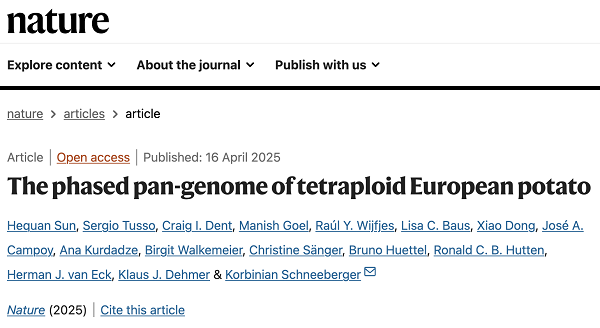XJTU and international team publish world's first haplotype-resolved tetraploid potato pangenome in Nature

The phased pan-genome of tetraploid European potato is published on Nature.
A team led by the Ministry of Education Key Lab for Intelligent Networks and Network Security and Xi'an Jiaotong University (XJTU)'s School of Automation Science and Engineering, in collaboration with the Max Planck Institute for Plant Breeding Research and Ludwig-Maximilians-University Munchen, has constructed the world's first haplotype-resolved pan-genome for tetraploid potatoes.
The groundbreaking research The phased pan-genome of tetraploid European potato, published in Nature, advances potato genome theory and technology, deciphers 85 percent of genetic variations in European tetraploid potato populations, and provides critical genomic resources for smart breeding and global food security.
Commercial potatoes are predominantly autotetraploid, meaning each chromosome exists in four nearly identical copies (A1/A2/A3/A4). Reconstructing these copies (genome phasing) has long been a global scientific challenge, leaving vast gaps in understanding tetraploid potato genetics.
To decode genetic diversity in tetraploid potato populations, trace their breeding history, and provide molecular-level insights for data-driven breeding, the team launched this pan-genome study.
The team designed a novel computational method for haplotype phasing in autotetraploids, overcoming longstanding phasing hurdles.
It analyzed 10 tetraploid potato varieties (sourced from 1810 - 1932), reconstructing 40 high-quality haplotype genomes. Lineage analysis revealed these historic varieties as core materials in European potato breeding, widely used to hybridize modern cultivars. They represent the genetic diversity of European cultivated potatoes and serve as a vital reference for assessing modern varieties' genetic potential.
The research overcame critical technical bottlenecks in polyploid genome phasing, and unveiled the genetic diversity landscape of tetraploid potatoes, characterized by "ultra-high heterozygosity + limited haplotypes," enriching genome theory and filling a major research gap.
The research result deepens the current understanding of potato genetics, and paves the way for precision breeding to enhance crop resilience and productivity.

